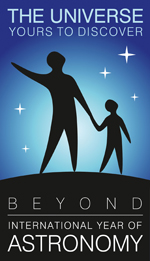Viewing the Universe Bit by Bit: New Directions and Uses of Astronomy Visualization Software
24 February 2010
Kavli Institute for Cosmological Physics, Chicago, USA
April 28-30, 2010
New, visually rich, astronomical software environments coupled with large web-accessible data sets hold the promise of innovative and exciting ways to teach, collaborate, and explore the Universe. Exploring the Universe Bit by Bit will be a hands on workshop that will focus on four key visualization software environments: Google Sky, World Wide Telescope, Celestia, & Partiview, with the immediate goals of developing applications and seeding new collaborations during the workshop.
This interdisciplinary workshop is intended to bring together scientists, educators (formal and informal), and software developers to promote innovative uses of the emerging software platforms in scientific research and as tools for learning and teaching. With the help of developers of these applications, we will investigate their capabilities, strengths, and weaknesses; and identify future directions. A primary focus will be the creation of tours, classroom applications, collaborative research environments, and laboratory exercises during the workshop. These development efforts will be supported by mini-tutorials and one-on-one instruction by the creators of these products. The principal developers of Google Sky (Noel Gorelick, Andrew Connolly, and Ryan Scranton), World Wide Telescope (Jonathan Fay), Celestia (Chris Laurel), Partiview (Stuart Levy) will lead the instruction. This workshop is modeled after the successful "Viewing the Universe:via the World Wide Web" workshop held at the University of Chicago in 2008.
Goals of the Workshop:
• Developing new ways of using astronomical software environments in research and education, incorporating current cutting-edge research and data
• Seeding new collaborations, especially cross-cutting & cross-disciplinary
• Identifying strategies to reach underserved communities with this technology (e.g., rural and inner city)
• Incorporating current research data into publicly accessible forums
• Providing feedback to software developers from educators and scientists
• Expanding the current user base
Who Should Apply:
Educators and scientists who are using (or are very interested in starting to use) these new software platforms for scientific collaboration, education, data sharing, and public outreach.
One of the goals of the workshop is to foster expansion of the current user base. We will be looking for participants who have a wide range of innovative ideas. We are especially interested in ideas with the potential for significant impact (e.g., on how the new software platforms are used in different environments or in audiences reached).
This workshop will explore Google Sky, WorldWide Telescope, Celestia and Partiview with the developers of these platforms.
Web site : http://kicp-workshops.uchicago.edu/universe2010
Applications are due 15 March 2010
Search IYA2009 Updates

National Nodes: 148
Organisational Nodes: 40
Organisational Associates:33
National Websites: 111
Cornerstone Projects: 12
Special Task Groups: 11
Special Projects:16
Official Products:8
Media Partners:22


